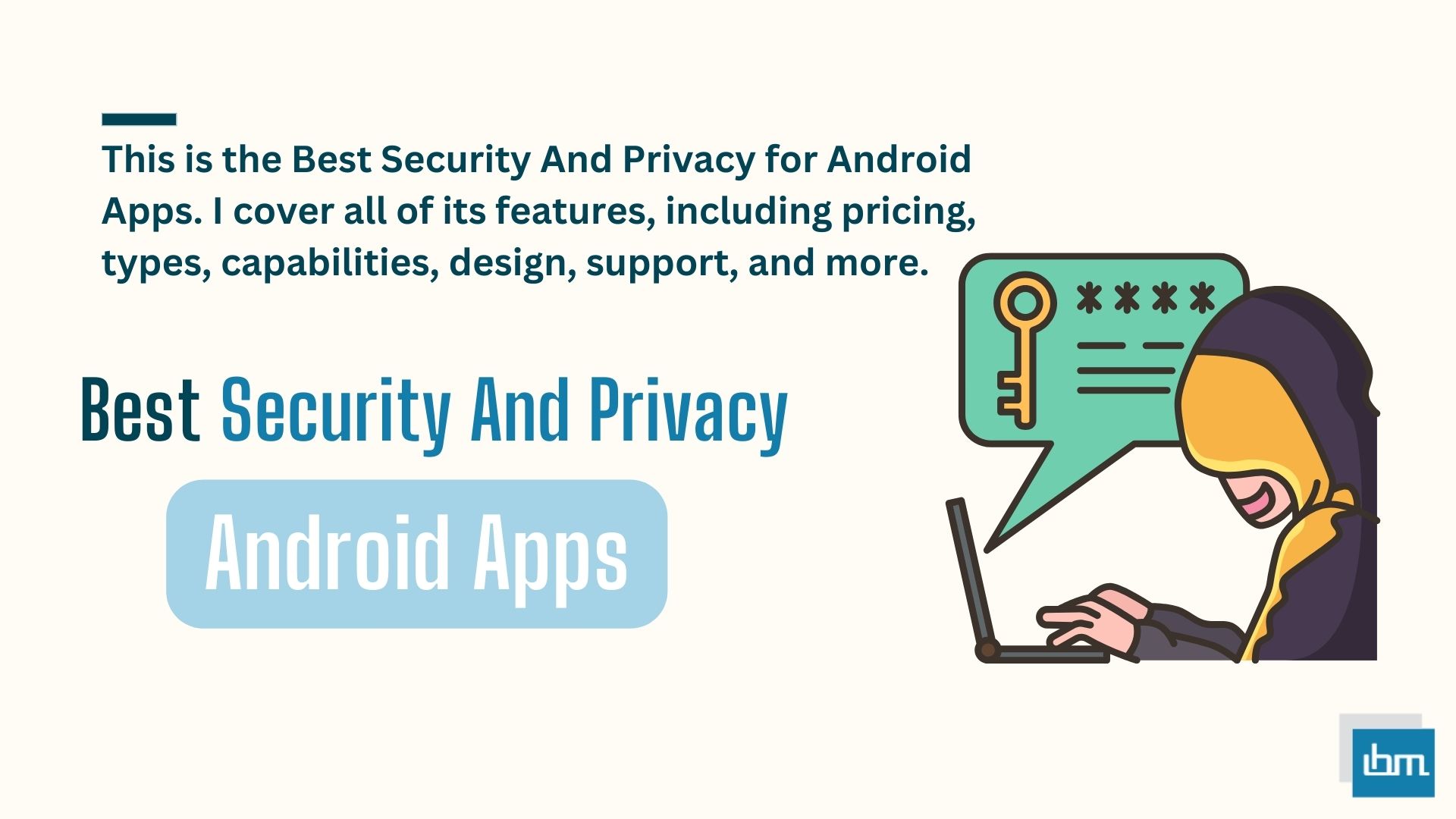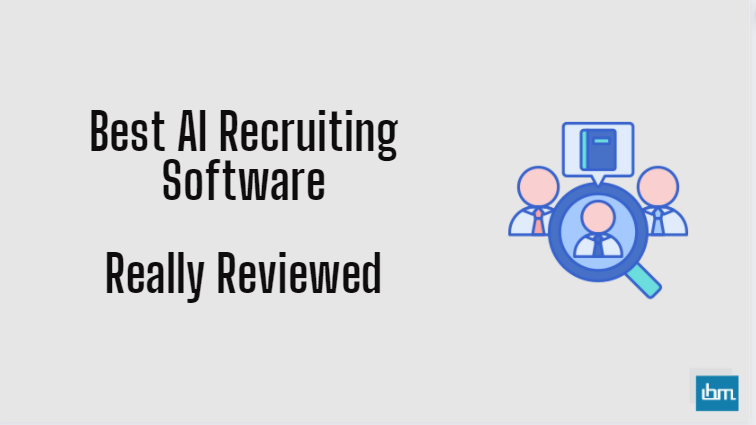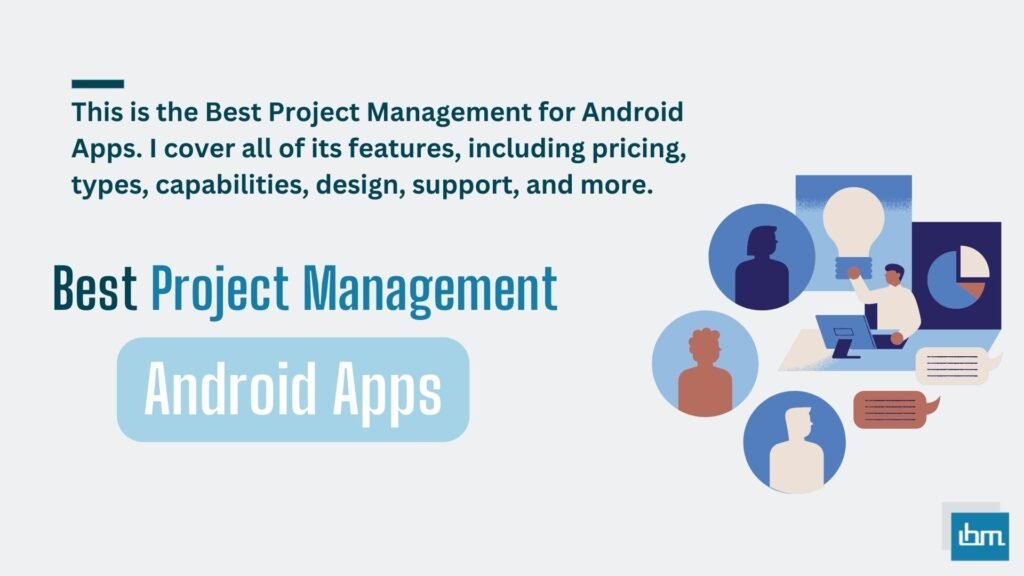In today’s digital world, mobile devices have become essential tools for communication, work, entertainment, and financial transactions. Among these, Android phones are one of the most widely used platforms, making them a prime target for cybercriminals.
With an increase in data breaches, malware, and privacy violations, ensuring the security and privacy of Android apps is more important than ever. As users store sensitive personal information, such as passwords, banking details, and private conversations on their phones, it’s crucial to safeguard this data from unauthorized access and malicious threats.
Android apps often require access to various permissions, which can expose your personal information if not properly managed. While many apps offer convenient features, some may collect excessive data or track your activities without your consent. This is where strong security measures, such as encryption, malware detection, and regular updates, play a vital role in maintaining your privacy.
In this blog, we will explore the importance of security and privacy for Android apps, highlight common threats, and provide tips on how to protect your device from potential risks. By taking the necessary steps, you can ensure a safer digital experience while using Android apps, giving you peace of mind in an increasingly connected world.
Security And Privacy Apps Compared: Features & Benefits for 2025
| App Name | Key Features | Price/Trial | Ratings |
|---|---|---|---|
| LastPass | Password manager, secure sharing, password generator | Free trial: Yes | 4.5 ⭐️ |
| Avast Mobile Security | Malware protection, web shield, app locking, anti-theft features | Free trial: Yes | 4.3 ⭐️ |
| Signal | End-to-end encryption, voice/video calls, disappearing messages | Free trial: No | 4.7 ⭐️ |
| ProtonMail | End-to-end encryption, self-destructing emails, anonymous sign-up | Free trial: Yes | 4.6 ⭐️ |
| 1Password | Password vault, travel mode, secure sharing, two-factor authentication | Free trial: Yes | 4.8 ⭐️ |
| DuckDuckGo | Privacy-focused search engine, tracker blocking, anonymous browsing | Free trial: No | 4.6 ⭐️ |
| Orbot | Tor network access, anonymized browsing | Free trial: No | 4.2 ⭐️ |
| Wickr Me | Encrypted messaging, file sharing, self-destructing messages | Free trial: No | 4.5 ⭐️ |
| Hushed | Temporary phone numbers, call/text privacy | Free trial: Yes | 4.3 ⭐️ |
| Trend Micro Mobile Security | Malware protection, privacy scanner, anti-theft features | Free trial: Yes | 4.1 ⭐️ |
This table summarizes the apps along with their key features, pricing details including free trials, and user ratings with star symbols for easy reference.
What is Best Security and Privacy Apps for Android.
Here are my top picks for the Best Security and Privacy Apps for Android Phones to use for your personal and professional needs. we have also found nine other fantastic apps to ensure your mobile device stays protected.
1. Lastpass.

LastPass is a top-tier password manager that provides the necessary tools for organizing and safeguarding all your login details. It allows you to create strong passwords, store login information, categorize websites, sync data across devices, autofill logins on mobile and desktop, and set up a master password for added security.
What sets LastPass apart is its generous free plan, offering unlimited password storage, autofill capabilities, multi-factor authentication, and more. Keep in mind that the free plan is restricted to a single device.
Key Features:
- Access the free version.
- Choose from various subscription plans: Premium, Families, Teams, Business.
- Get support through Email, FAQs, Help Topics, and Community.
Pros:
- Efficient management of passwords.
- Automatic password creation.
- Synchronization on multiple devices.
Cons:
- There is no antivirus available.
- Live chat support is not provided.
- The free plan only allows for one device.
2. Avast Mobile Security.

Avast Mobile Security stands out as our top choice, providing all the necessary tools for users to safeguard their privacy and security while browsing the web on their mobile devices. The free version includes essential features such as WiFi security, a malicious website blocker, a threat and vulnerability scanner, an encrypted photo vault, and helpful privacy and security tips.
Notably, the app offers active data breach monitoring, alerting you promptly if your login details are compromised. Upgrading to the Pro version unlocks additional perks like a built-in VPN and unlimited photo storage.
Key Features:
- Access the free version of the product.
- Antivirus and anti-malware protection.
- App lock and call blocking.
- Wi-Fi security and VPN.
- Junk cleaner and performance booster.
- Choose from different subscription plans, including the Pro plan for $4.99/month.
- Get support through email, FAQs, help articles, and forum.
Pros:
- Continuous monitoring of data breaches.
- Blocking of harmful websites.
- Comprehensive free version features.
- Regular updates.
- Easy to use.
- Secure encrypted photo storage feature.
Cons:
- Absence of password organization.
- Lack of live chat support.
- Ads in the free version.
- Can be resource-intensive.
- No password administration.
3. Signal.
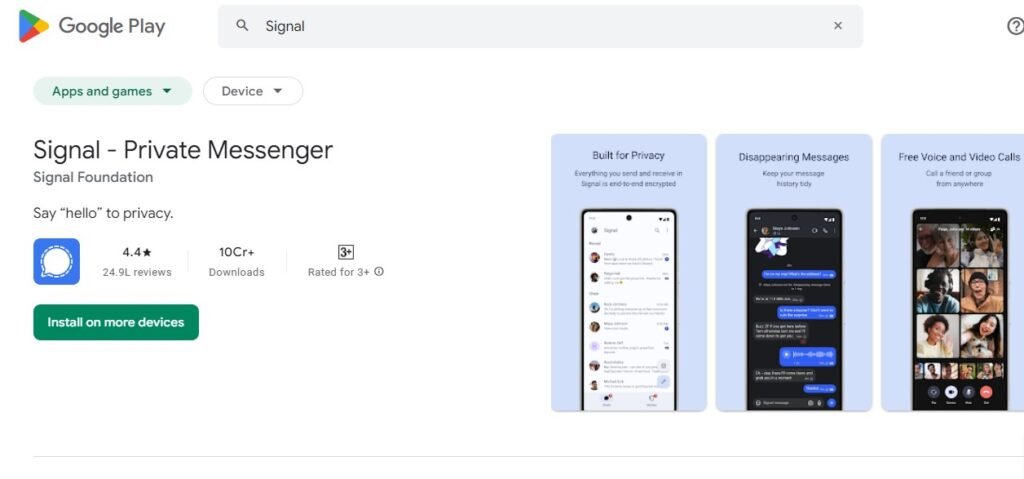
Signal stands out as the top choice for individuals who prioritize privacy and security in their messaging app. With a plethora of exclusive privacy features, such as end-to-end message encryption, disappearing messages, and voice and video calls, Signal ensures your conversations remain confidential.
You can seamlessly send texts, images, GIFs, videos, and audio files, just like any other messaging app. Additionally, Signal supports group chats for private communication within teams and friend circles. Notably, Signal’s encryption protocol is open-source, free of charge, and devoid of advertisements. Moreover, you can personalize alerts for each contact and even utilize the built-in photo editor.
Key Features:
- No cost involved.
- No subscription options.
- Assistance provided through Help/FAQs, Email, Tickets, and Community Help.
Pros:
- Available for free usage.
- Private messaging and calling with encryption.
- Includes a photo editor feature.
Cons:
- Absence of password management.
- Lack of antivirus protection.
- No password or antivirus management.
4. Protonmail.

ProtonMail provides a secure and privacy-focused alternative to email services like Gmail and Outlook for users who are concerned about their privacy when using services provided by companies like Google and Microsoft. Unlike other apps, Proton is open-source and verified by independent auditors, offering end-to-end email encryption.
Users can create multiple email addresses under the same account, add a custom domain, set custom email filters, and more. ProtonMail also supports self-destructing messages for secure communications and is hosted in Switzerland, known for its strong privacy laws. The app is ad-free and free to use, with the option to upgrade to a premium plan for additional features like multi-user support, priority support, and more storage.
Key Features:
- Access the free version of the service.
- Choose from different subscription plans, including ProtonMail Plus for $5/month.
- Get support through email or the Knowledge Base.
Pros:
- Encrypted email service at no cost.
- No advertisements.
- Utilizes open-source technology.
Cons:
- Absence of password organization.
- Lack of password control.
- Inadequate password supervision.
5. 1Password.

1Password is a highly popular and reliable password manager that is suitable for both personal and professional purposes. With this app, you can conveniently store various types of sensitive information such as login details, credit card information, addresses, private notes, passports, driver’s license details, and other important documents.
The app ensures that your data is synchronized across all your devices, making it easily accessible. Additionally, it offers the convenience of autofilling your information for quicker logins. 1Password also prioritizes your security by promptly notifying you in case of any data breaches and only filling information on verified browsers to protect you from phishing attempts.
Moreover, it provides unique solutions for businesses, including secure password vault sharing, admin controls for managing permissions, guest accounts, usage reports, and custom groups for efficient team organization.
Key Features:
- No free version offered.
- Subscription plans: 1Password for $2.99/month, 1Password Families for $4.99/month, Business for $7.99/user/month, Enterprise with custom quote.
- Support options include Email, Chat, Forum, and Help Articles.
Pros:
- Effective management of passwords for enhanced security.
- Timely notifications for security breaches.
- Tailored solutions for companies and enterprises.
Cons:
- No version available for free.
- No option for live chat support.
- There is no free version and live chat is not offered.
6. Duckduckgo.
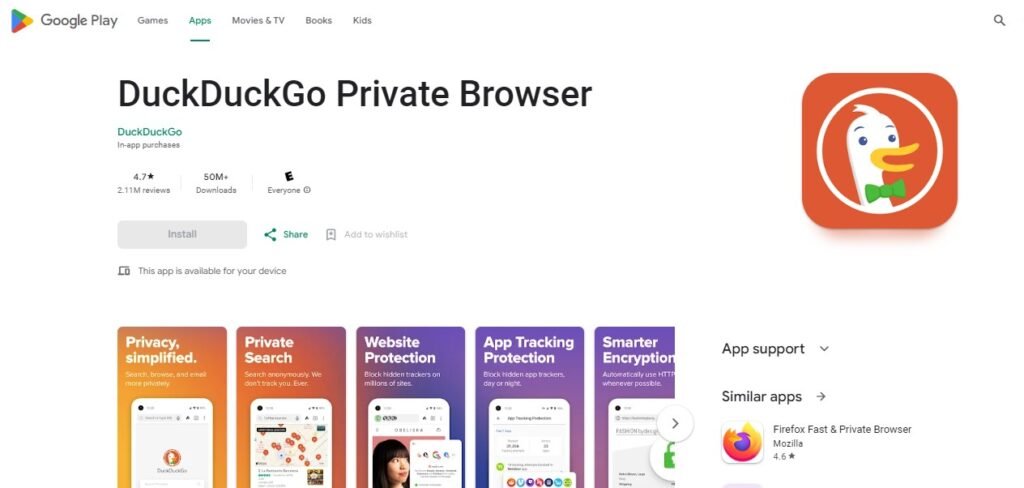
With the increasing concern among mobile users regarding data privacy, many are making the switch from Chrome to DuckDuckGo as their go-to mobile browser. DuckDuckGo stands out as a privacy-focused browser that prioritizes user data protection while browsing the internet.
Unlike other mobile browsers, DuckDuckGo provides unique privacy features such as website privacy grades, tracker blocking, and a convenient button for clearing tabs and browsing history with a single tap.
Additionally, DuckDuckGo offers its own private search engine for users wary of entrusting their data to Google or Bing, and the app ensures HTTPS encryption whenever possible. It’s also important to mention that DuckDuckGo has rolled out beta versions of App Tracking Protection for Android and Email Protection.
Key Features:
- No cost involved.
- No subscription required.
- Assistance provided through email, FAQs, Help Pages, and Community support.
Pros:
- Free to use with no cost involved.
- Grades provided for website privacy.
- Mandatory HTTPS encryption enforced.
Cons:
- Live chat support is not available.
- Antivirus software is not provided.
- There is no option for live chat assistance.
7. Orbot.

Download: Android
Tor (The Onion Router) is a freely available software that empowers individuals to navigate the online realm without being subjected to surveillance or traffic analysis. Orbot, on the other hand, is a complimentary proxy application that harnesses the power of Tor to safeguard your internet traffic by encrypting it and concealing your online activities through a network of computers spread across the globe.
In the event that your mobile network obstructs Tor access, Orbot comes to the rescue with its remarkable “Bridge Servers” feature, enabling you to circumvent these limitations. Notably, Orbot is not only free of charge but also open-source, allowing users to independently verify its claims of providing robust security and privacy.
Key Features:
- No cost involved.
- No subscription options.
- Assistance provided via email.
Pros:
- Utilizes Tor for safeguarding online activities.
- Browsing activity protected with Tor.
- Tor used for secure browsing.
Cons:
- Unavailable for iOS devices.
- Support options are limited.
- Not accessible on iOS platforms.
8. Wickr Me.
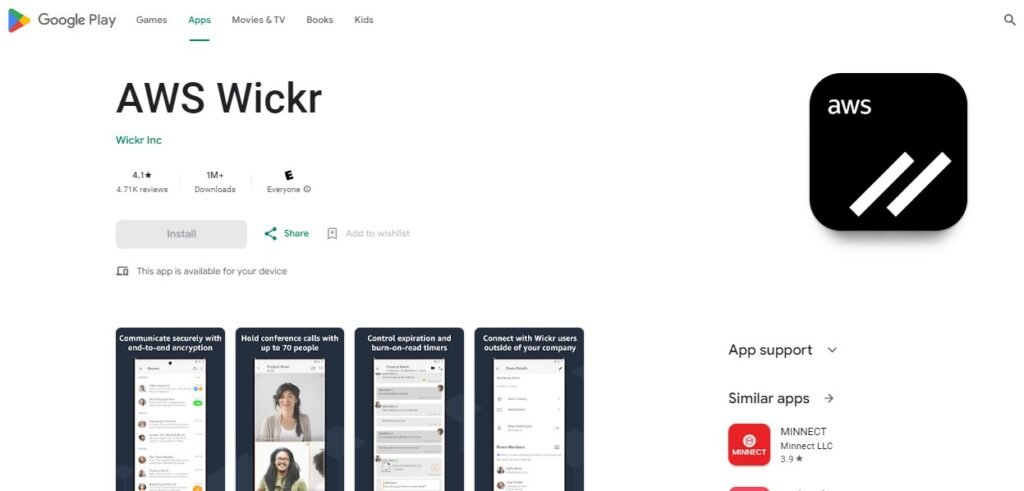
Wickr Me is an encrypted messaging app that prioritizes your privacy. Similar to Signal, it allows for secure 1:1 and group messaging, as well as encrypted voice calling, voice memos, file sharing, and video sharing.
Unlike other messaging apps, Wickr Me doesn’t require a phone number or email for sign up and doesn’t store any metadata related to your conversations. What sets Wickr apart is its exceptional features for businesses, such as dedicated onboarding and training, pre-configured security groups, multiple network admins, and secure screen sharing. The free version of Wickr Me supports up to 10 users, retains data for 30 days, and offers 1 GB of storage for file transfers.
Key Features:
- Access the complimentary version.
- Choose from different subscription options: Silver for $4.99/user/month, Gold for $9.99/user/month, Platinum for $25/user/month.
- Get assistance through various support channels: Email, Phone, Help/FAQs, Chat, Ticket.
Pros:
- Enhanced privacy for messaging through encryption.
- Secure communication through encrypted voice calls and voice memos.
- Advanced solutions for businesses at an enterprise level.
Cons:
- Lack of antivirus protection.
- Absence of password management.
- No security measures in place.
9. Hushed.

Hushed is the perfect solution if you ever require an additional anonymous phone number for making calls or sending texts. With just a few taps, Hushed allows users to easily set up and manage multiple new phone numbers.
Unlike any other app on our list, Hushed offers a wide range of features including making calls, sending texts, sharing images, creating personalized voicemails, setting up auto-reply messages, call forwarding, and much more.
Additionally, Hushed integrates with Slack and Dropbox, enabling users to directly send and respond to messages through Slack and conveniently save voicemails, message history, and picture messages to their Dropbox accounts. Users have the flexibility to prepay for minutes, opt for pay-as-you-go for international calling and messaging, or subscribe for unlimited calling and texting at just $3.99 per month.
Key Features:
- No free version offered.
- Prepaid Plans: $1.99; Unlimited Subscriptions: $3.99/month; Pay-As-You-Go International Plans: $4.99.
- Support provided through Email and FAQs/Help Center.
Pros:
- Allows for anonymous calling and texting, ensuring privacy and confidentiality.
- Seamlessly integrates with popular platforms like Dropbox and Slack, enhancing productivity and collaboration.
- Enables international calling and texting, facilitating communication across borders.
Cons:
- Chat support is not available.
- Live chat is not an option.
- There is no live chat feature.
10. Trend Micro Mobile Security.

Trend Micro Mobile Security offers comprehensive mobile security with a range of features. With its Web Guard feature, the app safeguards users against fraud and scams by blocking malicious websites. Additionally, it allows users to enable a VPN for a more private browsing experience.
The WiFi Checker feature identifies potential risks to prevent data leakage, while the Content Block feature blocks potentially harmful websites, ads, and trackers on Safari. What sets Trend Micro Mobile Security apart from other apps is its built-in browser, which includes ad-blocking for a clutter-free web browsing experience. Moreover, the app provides iMessage protection by automatically redirecting incoming texts with suspicious links to the junk folder.
Key Features:
- Access the free version of the product.
- Choose from different subscription plans, starting at $4.99 per month.
- Get support through various channels such as Help Center, Email, Phone, and Chat.
Pros:
- Enjoy web browsing without any advertisements.
- Stay safe from harmful websites, ads, and tracking.
- Keep your iMessages secure and protected.
Cons:
- Live chat feature is not available.
- There is no option for live chat.
- Live chat is not supported.
How to Choose the Best Security and Privacy App for Your Needs
When selecting the best security and privacy app for your needs, it’s important to assess the level of protection you require. Start by evaluating your device’s operating system, as some apps are designed for specific platforms like iOS, Android, or Windows. Look for apps that offer robust features such as encryption, real-time threat detection, and privacy monitoring. A key factor is the app’s track record; check for reviews, ratings, and independent security audits to ensure reliability.
Ensure that the app offers essential privacy features, like VPN services to mask your IP address, and ad-blockers to avoid unwanted tracking. Consider the usability of the app as well—user-friendly interfaces make it easier to set up and use without overwhelming you with complex settings.
Don’t forget to check for any hidden costs or limitations in the free versions, such as limited device protection or restricted access to premium features. Also, consider the reputation of the company behind the app; established, trusted brands tend to offer more secure and consistent service. Ultimately, a good security and privacy app is one that aligns with your specific needs, offers comprehensive protection, and is transparent in its practices.
Benefits of Using a Security and Privacy App
Using a security and privacy app offers several important benefits that protect both your data and online presence. One of the primary advantages is enhanced security. These apps can prevent malware, ransomware, and phishing attacks from compromising your personal information. With features like real-time threat detection, they continuously monitor your device for vulnerabilities and alert you when any suspicious activity occurs.
Additionally, privacy apps help you maintain anonymity by preventing unauthorized access to your personal data. By blocking intrusive ads and tracking cookies, these apps reduce the chances of being monitored by third-party advertisers, helping to safeguard your browsing history. Many privacy apps also offer secure browsing through VPNs (Virtual Private Networks), which encrypt your internet connection and hide your IP address, ensuring that your online actions cannot be traced back to you.
Using these apps also allows for peace of mind. As digital threats evolve, security and privacy apps are constantly updated to address new risks. Furthermore, they can help you stay compliant with privacy laws and regulations, which is especially important for businesses handling sensitive client information. Overall, these apps provide a comprehensive layer of protection that enhances your digital security.
Tips To Get The Most Out of Your Security and Privacy App
To maximize the effectiveness of your security and privacy app, start by keeping the app updated. Developers regularly release security patches and updates to address new vulnerabilities, so enabling automatic updates ensures that your app is always up to date with the latest protection.
Next, familiarize yourself with the app’s features and settings. Many apps offer customizable options, such as adjusting security levels, choosing which data to encrypt, or setting up specific rules for blocking unwanted activity. Explore these settings and tailor them to suit your needs for the highest level of protection.
It’s also important to combine your security app with other security measures. Use strong, unique passwords for all accounts and enable two-factor authentication wherever possible. Many security apps also offer password managers that can help you generate and store secure passwords.
If the app includes a VPN feature, make it a habit to use it whenever you connect to public Wi-Fi. This ensures your internet traffic is encrypted, even in potentially unsafe environments. Finally, review the privacy policies of the app regularly to ensure that the company’s practices align with your privacy preferences. By staying proactive and vigilant, you can ensure that your security and privacy app offers maximum protection.
FAQs About Security And Privacy Apps for Android in 2025
Android devices offer several privacy settings, including the Privacy Dashboard, which allows users to see which apps have accessed sensitive data. Users can manage app permissions through Permission Manager, control location access, and adjust settings for camera and microphone usage to enhance privacy.
To manage app permissions, navigate to Settings > Privacy > Permission Manager. Here, you can review and modify which apps have access to specific features like the microphone, camera, and location. You can choose to allow access all the time, only while using the app, or deny it altogether.
The Privacy Dashboard provides a comprehensive overview of how apps are accessing your data over time. It displays information on which apps have used sensitive data such as your camera and location in the last 24 hours, allowing you to make informed decisions about app permissions.
Security settings can be accessed by going to Settings > Security. Depending on your device’s version, you may find options for device lock, Google Play Protect alerts, and system updates to enhance overall device security
Yes, there are several apps designed to improve privacy on Android devices. Popular options include VPNs for secure internet browsing, password managers for secure credential storage, and dedicated privacy-focused browsers that limit tracking.
To protect your apps, enable a screen lock (PIN or biometric) on your device and regularly review app permissions through the Permission Manager. Additionally, consider using app lock features available in some security apps to add an extra layer of protection.
If you suspect an app is misusing your data, immediately revoke its permissions through Settings > Privacy > Permission Manager. You can also uninstall the app if necessary and report it to Google Play for violating privacy policies.
While many third-party privacy apps can be beneficial, it’s crucial to research their credibility and read user reviews before installation. Always download apps from trusted sources like Google Play Store to minimize risks associated with malware or data breaches.
Android incorporates various features designed for user privacy, such as minimizing permission requests during app installation and providing clear indicators when the camera or microphone is in use. These measures help users maintain control over their personal information while using their devices.
Conclusion
Android apps are designed with a robust security framework that prioritizes user privacy and data protection. At the core of this framework is the application sandbox, which isolates each app’s data and code, ensuring that malicious apps cannot access sensitive information from other apps. This isolation is crucial for maintaining user trust and safeguarding personal data from unauthorized access.
Permissions play a vital role in Android’s security model. When users install an app, they are prompted to grant specific permissions, such as access to contacts or location. This system empowers users to control what information they share, allowing them to make informed decisions about their privacy. The Permission Manager feature further simplifies this process by enabling users to manage all app permissions in one central location.
Android also incorporates advanced security features like Google Play Protect, which scans apps for malware and suspicious behavior before installation. This proactive approach helps mitigate risks associated with downloading harmful applications. Additionally, regular updates and security patches are essential for protecting devices against emerging threats.
To enhance user privacy, Android includes a Privacy Dashboard that provides insights into how often apps access sensitive data. This transparency fosters greater awareness among users regarding their data usage and encourages them to adjust permissions as needed.
In conclusion, Android’s commitment to security and privacy is evident through its layered defense mechanisms, user-centric permission controls, and ongoing efforts to educate users about their rights. By prioritizing these aspects, Android aims to create a safer environment for app usage while empowering users to take charge of their personal information.

